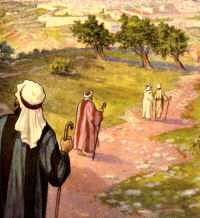» Enjoy our Liturgical Seasons series of e-books!
Someone asked him, "Lord, will only a few be saved?" He answered them, "Strive to enter through the narrow gate, for many, I tell you, will attempt to enter but will not be strong enough. After the master of the house has arisen and locked the door, then will you stand outside knocking and saying, 'Lord, open the door for us.' He will say to you in reply, 'I do not know where you are from.'"
Sunday Readings
The first reading is taken from Isaiah 66:18-21 and was written after the return from exile, 538 B.C. The aim was to console the returned exiles, who were depressed when they saw the sad state of Jerusalem and the poverty of the country. Isaiah foretold the future glory of Jerusalem to which people of all nations would come. It would be the center from which the knowledge of the true God would be dispersed.
The second reading is from St. Paul to the Hebrews 12:5-7, 11-13. In last Sunday's lesson St. Paul encouraged Christians to be ready to face adversity and hardships. He compared them with athletes who endure so much in order to win a contest. Today he reiterates that we must expect hardship — it is part of our training. We cannot win this prize unless we undergo this training. It is God who sends us these trials. He wants us to win the eternal prize because he loves us; he is our Father.
The Gospel is from St. Luke 13:22-30 and concerns those who hear Christ's message but refuse to follow it. While the questioner who asked how many would be saved did not get a direct answer from Christ, nevertheless it was made very clear to him and to all of us that each one's salvation is in his own hands. All those who accept Christ, his teaching and the helps he has made available to them, will enter the kingdom of God. On the other hand, those who are excluded from that eternal kingdom will have only themselves to blame. God invites all men to heaven. He gives all the help necessary to every man, but, because men have a free will which God cannot force, some will abuse that freedom and choose wrongly.
Christ mentions the narrow door through which we must enter into God's kingdom. This means that we must exercise self-restraint and mortification and this we do when we respect and keep his commandments. When we are called to judgment it will be too late to shout "Sir, open for us." We should have sought his mercy and his forgiveness during our earthly life, and he would have granted it.
Neither will it avail us to say that we knew him in life. Acquaintance with Christ is not enough. We should have loved him and become his real friends, which we could only do by being loyal followers of his. "He taught in our streets" will only prove our guilt. We could have learned his doctrine; we could have become his disciples, but we would not. The pagan who never heard of Christ will not be condemned for not following his teaching, but the Christian who did hear his doctrine and refused to carry it out, will deserve condemnation.
As descent from Abraham was not a claim for special consideration on the part of the Jews, neither will any other circumstances of nationality, birth or earthly privilege help us on the day of judgment Each one will stand or fall by his own mode of life during his term on earth. Nothing and nobody else can change the just judgment of God when that moment arrives for each one of us.
The thought of our moment of judgment is a staggering one even for the holiest of us. Things and actions that do not trouble us much now, will appear in a different light then. The prayers we omitted or said carelessly, the Masses we missed on flimsy excuses the little bit of continual injustice to a workman or customer, or the dishonesty practiced by a worker against his employer, the sins of impurity of which we thought rather lightly, the bad language so freely used and the scandal we spread so flippantly, the money wasted on drink or gambling when our children needed nourishment and clothing — these, and many other such faults of which we excuse ourselves so easily now, will not be a source of joy or consolation for us on that dread day, if we arrive at God's justice-seat still burdened with them.
We are dealing with God's mercy while alive. He will forgive any sin and any number of sins if we truly repent, and resolve to correct these faults. To do this is the only one guarantee that even God himself can give us of a successful judgment Every man who lives in God's grace will die in God's grace and be numbered among the saved. The man who lives habitually in sin, and refuses to amend his life, will die in his sinful state, and thus exclude himself from eternal salvation.
I have a free will. I can choose to pass that final examination or to fail it. The whole of my eternity, the unending life after death, depends on my choice now. If I choose to follow Christ and live according to his laws during the few years I have on this earth, I shall pass and shall be among the saved. If I ignore Christ and his laws now, he will not know me on the day of judgment I shall be among the lost. God forbid that I should choose the latter course.
— Excerpted from The Sunday Readings Cycle C, Fr. Kevin O' Sullivan, O.F.M.



